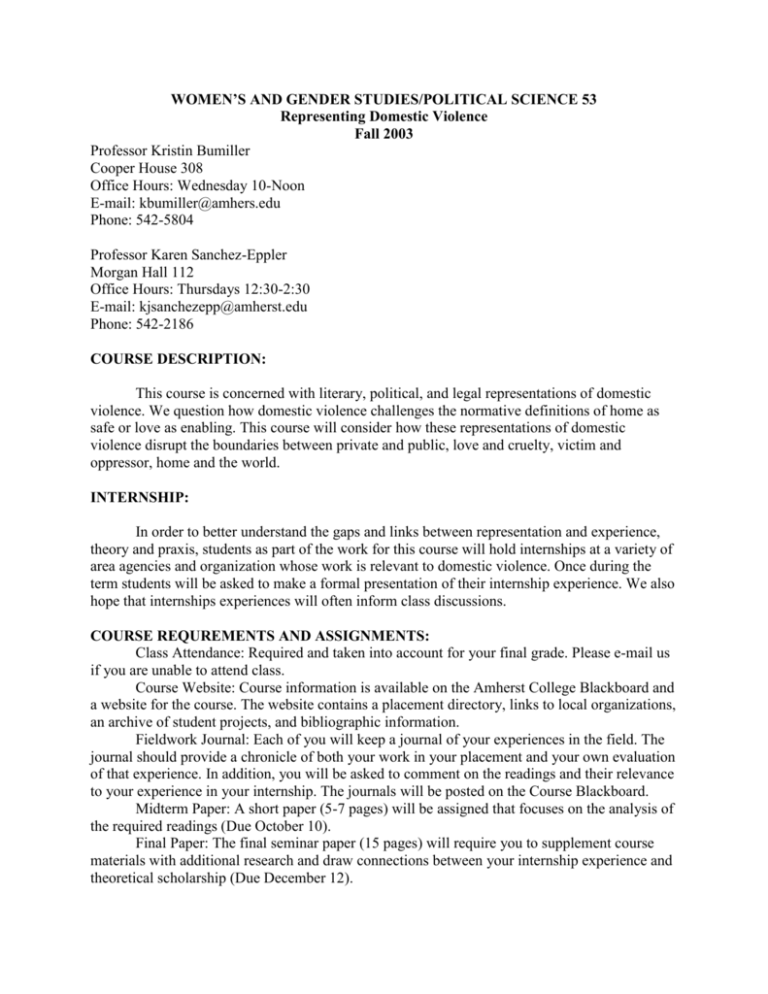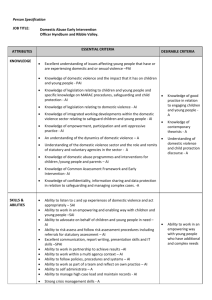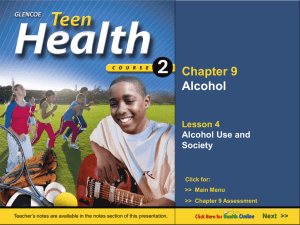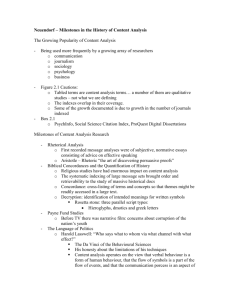
WOMEN’S AND GENDER STUDIES/POLITICAL SCIENCE 53
Representing Domestic Violence
Fall 2003
Professor Kristin Bumiller
Cooper House 308
Office Hours: Wednesday 10-Noon
E-mail: kbumiller@amhers.edu
Phone: 542-5804
Professor Karen Sanchez-Eppler
Morgan Hall 112
Office Hours: Thursdays 12:30-2:30
E-mail: kjsanchezepp@amherst.edu
Phone: 542-2186
COURSE DESCRIPTION:
This course is concerned with literary, political, and legal representations of domestic
violence. We question how domestic violence challenges the normative definitions of home as
safe or love as enabling. This course will consider how these representations of domestic
violence disrupt the boundaries between private and public, love and cruelty, victim and
oppressor, home and the world.
INTERNSHIP:
In order to better understand the gaps and links between representation and experience,
theory and praxis, students as part of the work for this course will hold internships at a variety of
area agencies and organization whose work is relevant to domestic violence. Once during the
term students will be asked to make a formal presentation of their internship experience. We also
hope that internships experiences will often inform class discussions.
COURSE REQUREMENTS AND ASSIGNMENTS:
Class Attendance: Required and taken into account for your final grade. Please e-mail us
if you are unable to attend class.
Course Website: Course information is available on the Amherst College Blackboard and
a website for the course. The website contains a placement directory, links to local organizations,
an archive of student projects, and bibliographic information.
Fieldwork Journal: Each of you will keep a journal of your experiences in the field. The
journal should provide a chronicle of both your work in your placement and your own evaluation
of that experience. In addition, you will be asked to comment on the readings and their relevance
to your experience in your internship. The journals will be posted on the Course Blackboard.
Midterm Paper: A short paper (5-7 pages) will be assigned that focuses on the analysis of
the required readings (Due October 10).
Final Paper: The final seminar paper (15 pages) will require you to supplement course
materials with additional research and draw connections between your internship experience and
theoretical scholarship (Due December 12).
BOOKS:
Dorothy Alison, Bastard Out of Carolina
Debra Dodson, Don’t Call Us Out of Name
Slavenka Drakuli, S: A Novel about the Balkans
Judith Herman, Trauma and Recovery
Gayle Jones, Eva’s Man
Linda Mills, Insult to Injury: Rethinking Our Responses to Intimate Abuse
Toni Morrison, The Bluest Eye
Sharon Lamb, New Versions of Victims
Elizabeth Schneider, Battered Women and Feminist Lawmaking
Books are available for purchase at Amherst Books, 8 Main Street. All other readings are
in the course packet available at the Political Science Department Office in Clark House or on
Reserve.
READINGS:
Week 1 (September 2)
INTRODUCTION
Video produced by the Violence Prevention Project of the Harvard Community Health
Plan Foundation, “Think: Violence is For People Who Don’t.”
Video produced by Barbara Sieck and Martina Castro, “All the World’s a Stage:
Confronting the Multiple Realities of Domestic Violence,” from Fall 2002
In class reading of “The Somebody Else Was Us.”
Week 2 (September 9)
Monday, September 8
Film: The Burning Bed
SEEKING SAFETY: IMAGINING REFUGE IN A VIOLENT WORLD
Discuss The Burning Bed
Donna Ferrato, Living with the Enemy (R)
Erin Pizzy, “A House for Women,” in Scream Quietly or the Neighbors Will Hear, 9-25.
(Handout)
Karen Kendrick, “Producing Battered Women,” in Nancy Naples, Community Activism
and Feminist Politics, 151-174.
Andrea Westland, “Pre-Modern and Modern Power: Foucault and the Case of Domestic
Violence, Signs, Summer 1999, 1045.
Sherrill Cohen, “Social Legacies of the Early Modern Women’s Ayslums,” in The
Evolution of Women’s Asylums Since 1500, 142-164.
Week 3
(September 16)
Film Monday, September 15: Carousel
THE DOMESTIC SCENE: GOOD AND BAD WOMEN
Discuss Carousel
Allison M. Moore, “The Good Woman: Asceticism and Responsibility from the
Perspectives of Battered Women,” in Winkler and Cole, The Good Body.
Gayle Jones, Eva’s Man.
Week 4
(September 23)
SEEKING AUTHORITY: LEGAL RESTRAINTS ON THE DOMESTIC
Commonwealth of Massachusetts statutes on Domestic Violence
Cliff Mariani, “Help Arrives,” Domestic Violence Survival Guide, 135-178.
Elizabeth Schneider, Battered Women and Feminist Lawmaking.
“Battered Mothers Speak Out,” (Research Report and In-class Video)
Mary Eaton, “Abuse by Any Other Name: Feminism, Difference, and Intralesbian
Violence,” in The Public Nature of Private Violence, 195-223.
Week 5
(September 30)
SEEING VIOLENCE: TRAUMA AND SEXUALITY
Judith Herman, “A Forgotten History,” “Child Abuse,” and “Remembrance and
Mourning,” in Trauma and Recovery, 7-32, 96-114, 175-195.
Sharon Lamb, New Versions of Victims: Feminists Struggle with the Concept, 13-41,
158-212.
Dorothy Alison, Bastard Out of Carolina
Week 6
(October 7)
CROSS-CULTURAL VIEWS OF VIOLENCE
Uma Narayan, “Cross-Cultural Connections, Border Crossing, and ‘Death by Culture,’”
in Dislocating Cultures, 83-117.
Sandra Cisneros, “Women Hollering Creek.”
Akhil Sharma, “Prosperity,” The New Yorker, 144-155.
Urvashi Butalia, The Other Side of Silence: Voices from the Partition of India, 109-171.
Fiona Ross, “Speech and Silence: Women’s Testimony in the First Five Weeks of the
Public Hearings of the South African Truth and Reconciliation Commission,” in
Veena Das, ed., Remaking a World: Violence, Social Suffering, and Recovery,
250-279.
Week 7
(October 21)
SEEING VIOLENCE: WARS AT HOME
Slavenka Drakuli, S: A Novel about the Balkans.
Helke Sander, “Prologue,” xvii-xxiii; Alexandra Stiglmayer, “The Rapes in BosniaHerzegovina,” 82-86, 102-107, 121-137, 161-169; Cynthia Enloe, “Afterward,”
219-230 in Alexandra Stiglmayer, Mass Rape: The War Against Women in
Bosnia-Herzegovina.
Laura Wexler, “What a Woman Can Do With a Camera,” in Tender Violence: Domestic
Visions in an Age of U.S. Imperialism, 15-51.
Week 8
(October 28)
MOTHERS AND INSTITUTIONS
The Memoirs of Abigail Abbot Baily, 51-81.
A Private War: Letters and Diaries of Madge Preston, xiii-xvi, 1-8, 39-41, 112-118, 159165, 286-288.
Louisa Piquet, the Octoroon, 1-60. (Handout)
Linda Gordon, Heroes in Their Own Lives, 82-115.
Debra Dodson, Don’t Call Us Out of Name.
Week 9
(November 4)
ORIGINS: IMAGES OF CHILDHOOD
Toni Morrison, The Bluest Eye.
Sigmund Freud, “‘A Child is Being Beaten’: A Contribution to the Study of the Origins
of Sexual Perversions,” in The Standard Edition, 17:175-204.
Ian Hacking, “The Making and Molding of Child Abuse,” in Critical Inquiry 17:253-288.
C. Henry Kemp, “The Battered Child Syndrome,” JAMA 181:17-24.
Martin A. Finkel, “Technical Conduct of the Child Sexual Abuse Medical Examination,”
Child Abuse and Neglect, 22:555-566.
Week 10
(November 11)
Film Monday November 10: “Capturing the Friedman’s”
ORIGINS: NAMING PERPETRATORS
Men’s Resource Center Lecture/Discussion
“Pit Bulls and Cobras–An Analysis of Men,” WIN NEWS, Spring 1998, 53.
Lenore Walker, “Psychology of the Battered Woman,” in The Battered Woman, 11-70.
Sharon Lamb, New Versions of Victims, 42-56.
Week 11
(November 18)
THE VIOLENCE OF THE STATE
Joshua DeShany v. Winnebago County Department of Social Services.
Linda Mills, Insult to Injury: Rethinking Our Responses to Intimate Abuse.
Week 12
(December 2)
Film Monday, December 1: Chinatown
COLONIALIST CAPITALISM AND DOMESTIC VIOLENCE
Discuss Chinatown
Mary Renda, “Military Intervention as Family Violence.”
Marion Smiley, “Battered Women and Bombed Out Cities: A Question of
Responsibility,” in Peter A. French et al. Eds., Moral Concepts, 15-35.
Week 13
(December 9)
WRAP-UP SESSION










